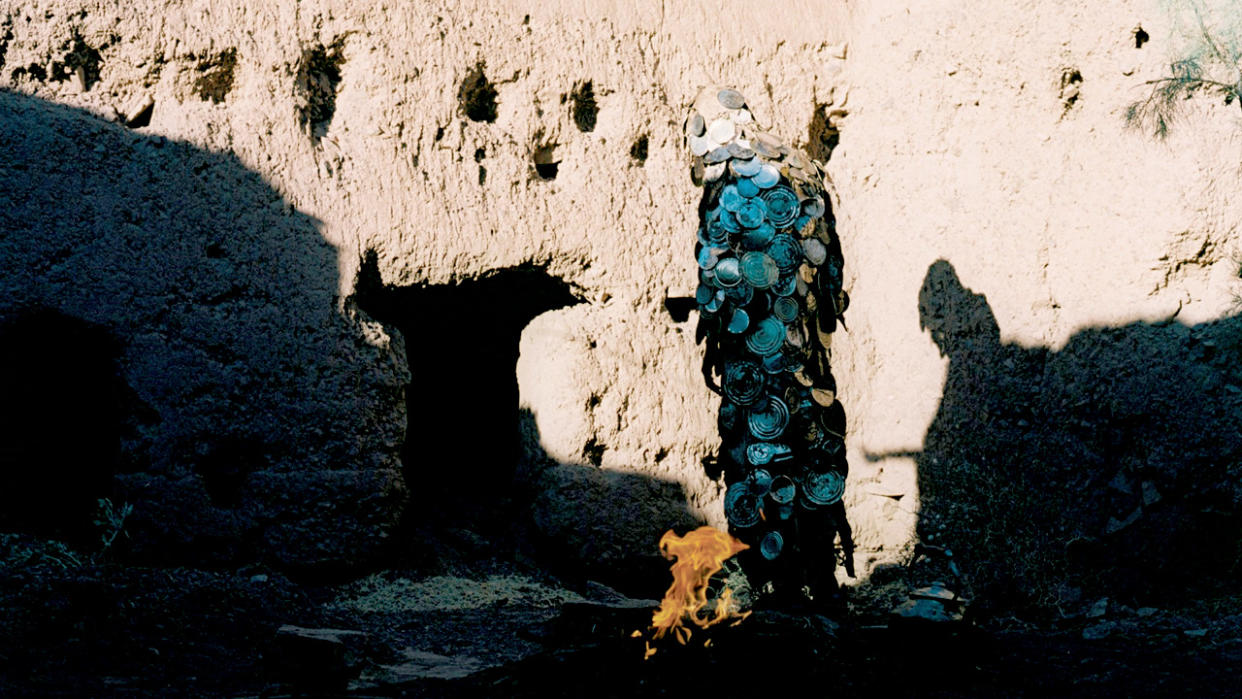Film Review: ‘The Sky Trembles and the Earth is Afraid and the Two Eyes Are Not Brothers’

Marquee letter placers won’t be the only ones profoundly unnerved by “The Sky Trembles and the Earth is Afraid and the Two Eyes Are Not Brothers,” the latest mind-muddling meditation from singular British experimentalist Ben Rivers. Eventually more narrative in nature than most of Rivers’ previous films — though the line between fact and fancy has always been a hazy one in his work — this Morocco-set fever dream traces the punishing descent into subjugation and madness that befalls a real-life European auteur when he abandons the remote Saharan set of his latest film. The minimalist surface of this avant-garde fable masks jangling crosscurrents of subtext on postcolonial retribution and the nature of authorship. His most agitated and enervating work to date — seemingly by design — “The Sky Trembles” is already causing tremors across the festival circuit, though only the most esoterically inclined distributors will meet its unaligned gaze.
The unwieldy moniker may sound like an abbreviated Fiona Apple album title, but “The Sky Trembles and the Earth is Afraid and the Two Eyes Are Not Brothers” is actually a line taken from “A Distant Episode,” a 1947 short story by Tangiers-based American expat Paul Bowles. That the text’s narrative is also heavily lifted here adds a further note of self-reflexivity to Rivers’ oblique allegorical study of cultural appropriation and the staggered re-telling of stories — with the violent transference of personal autonomy its most extreme outcome. Viewer mileage may vary as to how richly or resonantly Rivers expands on such loaded themes, but they’re most strikingly announced: Stray, sunstruck images and whirring sonic accents are likely to rattle persistently in the memories even of those perplexed by their notional meaning.
The film’s opening half-hour may be its most disorienting, as Rivers’ own directorial investigation is filtered through that of another artist, French avant-garde filmmaker Oliver Laxe (“You Are All Captains”). Initially taking place on the actual set of Laxe’s upcoming docu-fiction hybrid “The Mimosas,” “The Sky Trembles” introduces itself as a particularly deconstructed making-of doc, passively exposing heart-of-darkness disorder in Laxe’s own attempts to follow a wandering caravan through the Atlas Mountains. To what degree the onscreen auteur’s struggle is being represented or fabricated is anyone’s guess: Could Laxe, repurposed as another director’s leading man while helming his own project, be reflecting Rivers’ own authorial presence back at the man behind the camera? Are they conspiring to project their shared neuroses as simultaneous conveyors and creators of story worlds? The hall-of-mirrors possibilities are endless — albeit somewhat contingent on auds knowing Laxe’s real-world identity.
“Straightforward” may be the most relative of relative terms when it comes to Rivers, but the film’s perspective is streamlined when an overwhelmed Laxe is shown to “abandon” his own set, driving off into the desert with no apparent agenda. From this point, the film enters a wholly fictional realm, following the template of Bowles’ story. Attacked and abducted by a band of Reguibat nomads, the rogue director is made an ornamental slave of sorts: His tongue severed, he is clothed in a rustily opalescent suit of tin-can lids and made to dance on command for his new owners’ amusement. Time turns elastic, as the newly metallicized, mechanized Laxe — now effectively a walking wind chime — loses any human sense of perception. In turn, he is remotely objectified by Rivers’ camera, which returns to his point of view only in fleeting, frightened flashes.
As a statement on the dehumanizing effects of political and personal colonization — reverse-twisting the history of bilateral relations between France and Morocco — this sustained metaphor is as arresting as it is upsetting. It is, however, a tad overstretched. The film enters uniquely sensual torture-porn territory in its abrasive latter half, though the forceful repetition of themes and sensations alike palls a little in comparison to the intellectual playfulness of its opening.
It’s the beguiling strangeness of Rivers’ technique, then, that carries the film on a sandy sirocco to its inscrutably cathartic denouement. Shooting in texture-rich 35mm, absorbing hard sunlight so directly that the edges of the frame appear singed, Rivers uses the khaki starkness of his surroundings to place in relief his most nightmarishly surreal images. The disparate, densely meshed components of Philippe Ciompi’s sound design serve in themselves as a severe narrating voice: Strains of indigenous music, often disembodied, raise questions of the filmmakers’ relationship to the culture they’re observing, clashing with less identifiable industrial components that suggest the swarming, inarticulate noise in the captive’s head.
Related stories
Film Review: 'A Spell to Ward Off the Darkness'
Karlovy Vary Film Fest to Pay Tribute to Elio Petri, Anurag Kashyap, Ben Rivers
Get more from Variety and Variety411: Follow us on Twitter, Facebook, Newsletter
